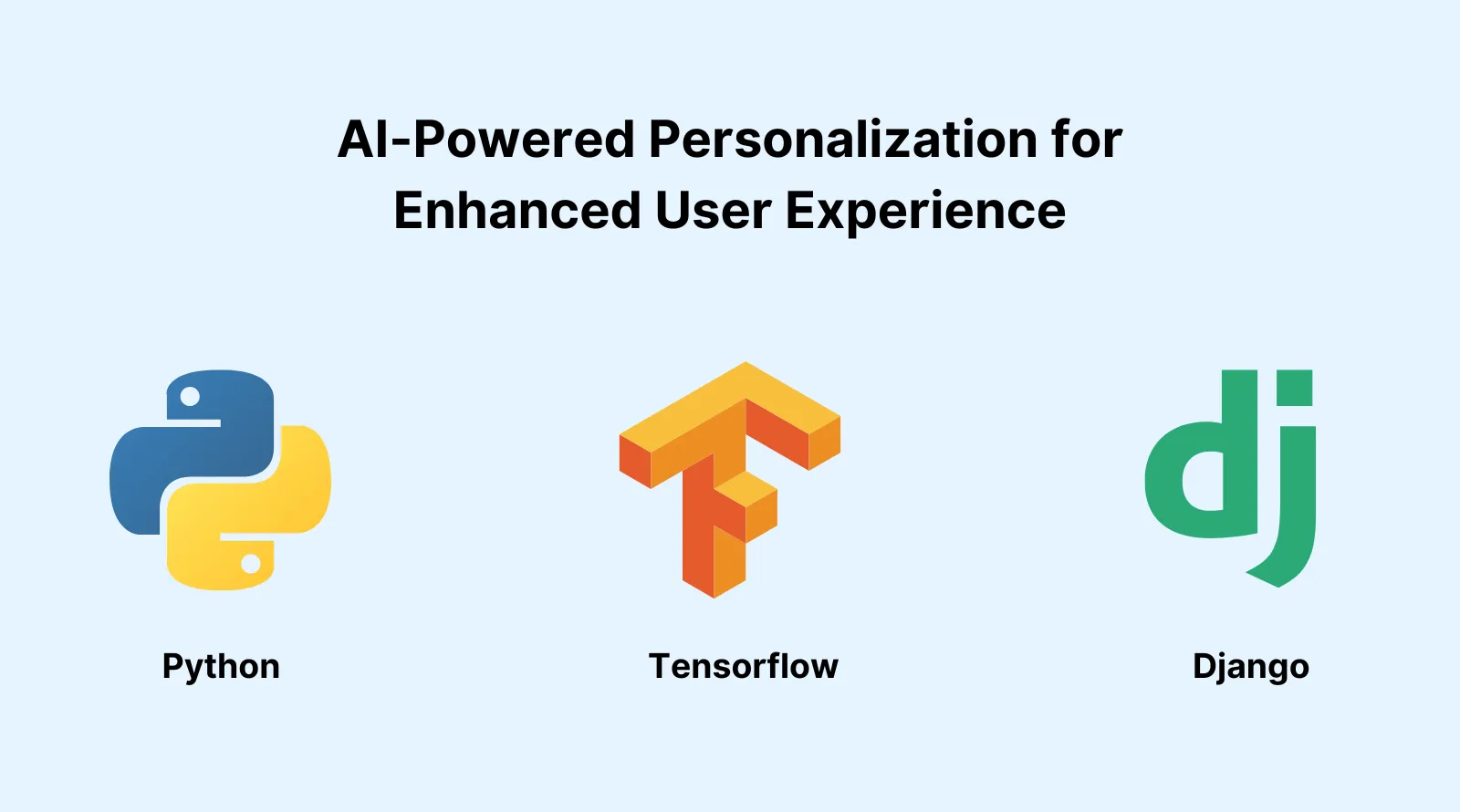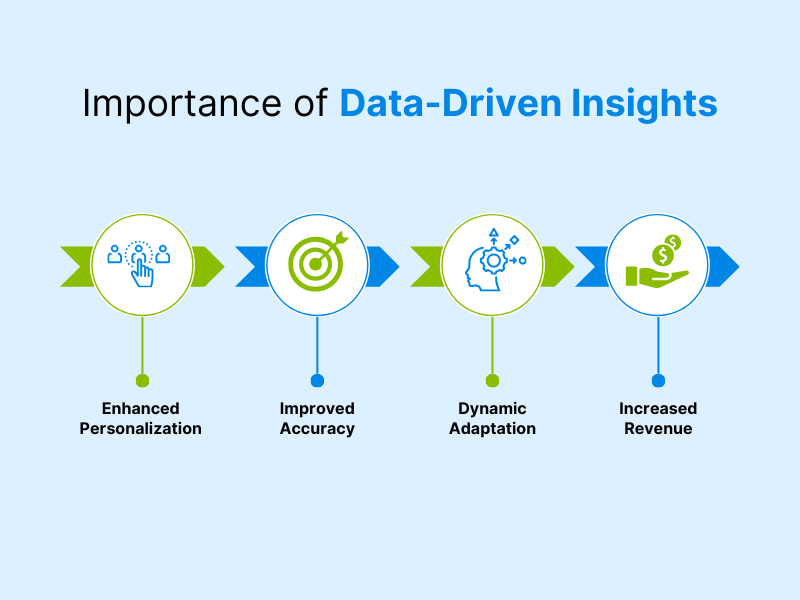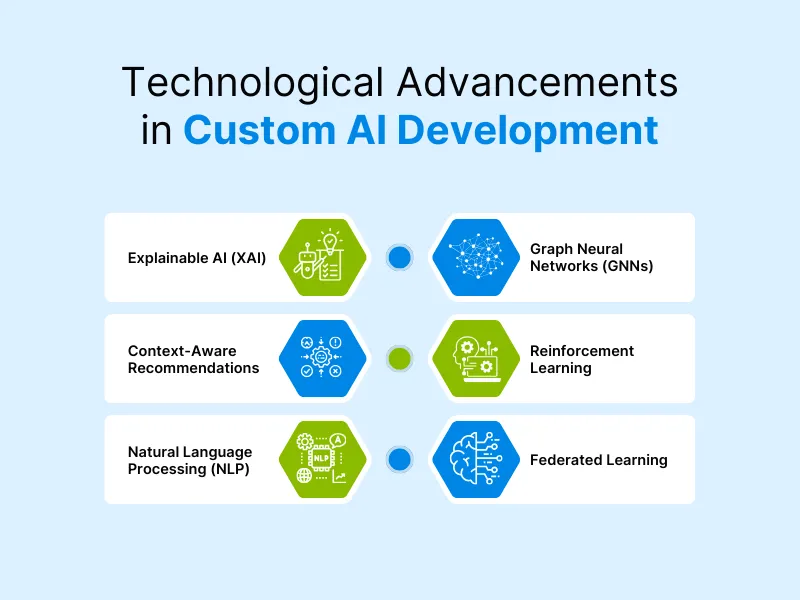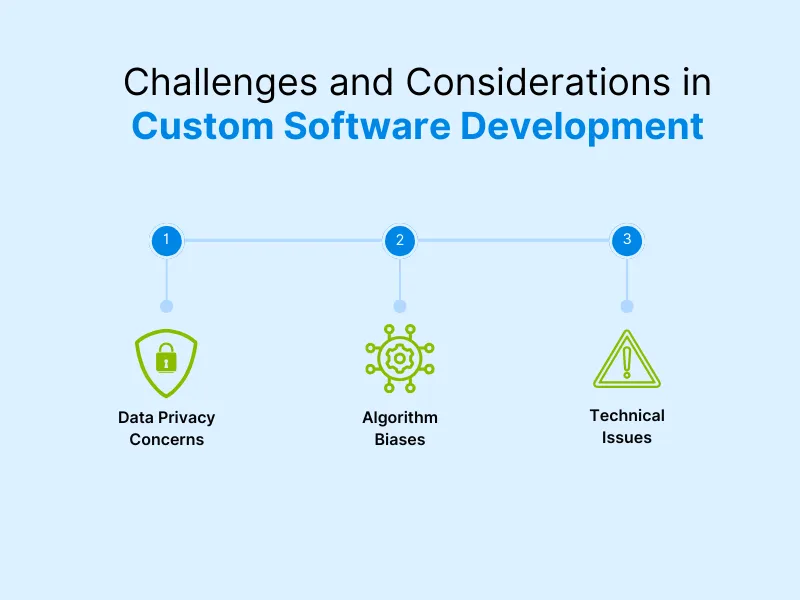How AI-Powered Recommender Systems in eCommerce Revolutionize the Shopping Experience
Have you heard about artificial intelligence-powered recommender systems or engines that are assisting eCommerce platforms in transforming customer shopping experience and engagement to the next level? These systems are advanced algorithms designed to analyze user behavior, preferences, and interactions to suggest products or services that a customer is likely to be interested in.

Consider a scenario where you are purchasing an iPhone 15 Pro Max on Amazon.com. When you scroll down the mobile application or the website, there is a specific section just below the product image and description — Customers who bought this also bought or Frequently bought together features commonly seen on platforms like Amazon and eBay.
Have you ever wondered what are these? Well, the simple answer is these are intelligent recommendations, offering you curated suggestions based on what other customers with similar interests have purchased.
AI advanced algorithms help you discover the perfect accessories or related products for your new iPhone 15 Pro Max, such as Screen Protector, iPhone Case, and Apple Compact Power Adapter.
So, What Are Recommender Systems?
Recommender systems or recommendation engines are advanced software solutions powered by artificial intelligence and machine learning algorithms to suggest the best products or services based on customer behavior analysis and past purchasing patterns.
These systems are an integral part of the information filtering system, providing suggestions for the most relevant products and services to the customer. They also use Big Data analytics and data science services to recommend items and are incredibly handy when the user has to choose a particular product from the vast array of options that a service might provide.
These systems play a crucial role in personalizing the online shopping experience, driving sales, and enhancing customer satisfaction.
TRooTech has curated this comprehensive blog on AI-based recommendation systems to define in detail their end-to-end role in augmenting and revolutionizing customers’ shopping experience on different ecommerce platforms.
When you read this blog, you will get familiar with
- Role of artificial intelligence in enhancing recommender systems
- How custom software development helps obtain personalization
- Role of custom AI solutions to increase customer engagement
- Cross-selling and upselling via custom recommender systems
- Technological advancement in custom AI development
AI’s Role in Enhancing Modern Recommendation Systems
Artificial Intelligence enhances modern recommender systems' accuracy, efficiency, and personalization features using machine learning algorithms. It can analyze vast amounts of data, such as user behavior, preferences, and interactions, to generate highly relevant recommendations in real time.
AI in eCommerce enables recommender systems to learn from each user's unique patterns, offering more personalized suggestions that evolve with changing tastes and habits. It receives ample support from machine learning, deep learning, and natural language processing (NLP) solutions that significantly improve recommendation quality.
For example, NLP enables systems to understand and interpret user reviews, ratings, and feedback, further refining the relevance of suggestions.
Also, AI eliminates the biases in recommendations, leading to fairer and more diverse suggestions.
Attaining Personalization Through Custom Software Development

So far we have discussed how artificial intelligence and machine learning algorithms empower the recommender engines of eCommerce platforms to provide highly personalized and relevant suggestions, leading to enhanced user experience and engagement.
However, our discussion would rather be complete by highlighting the crucial role of custom software development solutions in analyzing user behavior and delivering personalized recommendations.
Custom software solutions align with AI solutions to -
- Meet specific customer requirements and offer suggestions that align with users’ preferences, making their interaction with the platform more relevant and satisfying.
- Increase customer loyalty and foster a deeper connection between the user and the brand.
- Enhance conversion rates by presenting users with products or services that they are more likely to purchase.
- Higher scalability and flexibility to incorporate new AI technologies and data sources ensure that the system delivers high-quality recommendations as the business grows and evolves.
Now, let me ask you something.
Have you ever thought about how Netflix recommends the right movies and web series or how Spotify suggests the perfect list of songs you would love listening to?
Let’s find out how.
To answer this question satisfactorily, we first need to understand and analyze the role of various critical technologies, such as Python for data analysis, TensorFlow for building and training machine learning models, and Django for creating web applications.
Python for Data Analysis
Python is the backbone of many AI and machine learning projects, providing a vast array of libraries available for data analysis, such as Pandas and NumPy. It personalizes the customer shopping experience by processing large datasets, extracting meaningful insights, and detecting trends, and user segments.
To explain this point further, let’s take the example of Spotify which uses Python to analyze data and power its backend services. One of its blogs published on its official website mentions that Spotify extensively uses analytics and machine learning to enhance features like Radio, Discover, and recommendations. To streamline Hadoop interactions, they use Luigi, a tool that simplifies building complex data pipelines in Python. Luigi powers 90% of their map reduce jobs, with thousands of processes running across Hadoop clusters.
TensorFlow for Machine Learning Models
TensorFlow, an open-source machine learning framework developed by Google, is widely used for building and training deep learning models. It can create complex neural networks that predict what products or content a user might like. These models can learn from historical data and continuously improve as they process more user interactions, resulting in more accurate and personalized recommendations.
Here, we can cite the example of Carousell, a leading Singapore-based eCommerce company leveraging TensorFlow for efficient image classification and recommendation systems. By integrating advanced machine learning models, they enhance user experience, ensuring relevant and personalized content. Their data science and case study insights are shared on Medium, highlighting innovations in AI solutions in eCommerce.
Django for Web Applications
Django is a high-level Python-based web framework that's ideal for developing large-scale eCommerce solutions. It facilitates the rapid development of scalable applications, making it an excellent choice for complex projects. Django's robust architecture supports seamless integration with AI-driven recommendation systems, allowing for the efficient deployment of machine learning models.
Social media giant Instagram using Django to power its backend infrastructure, enabling the platform to deliver personalized content to its users. It allows Instagram to seamlessly handle massive amounts of data, including user preferences, interactions, and behaviors. The social media platform integrates with machine learning models that analyze data in real time, offering personalized feeds, recommendations, and targeted content to each user.
Align Custom Software Development With AI to Transform Shopping Experience
Unlock customer personalization like never before
Improved Customer Engagement with Custom AI Solutions
Did you know that according to McKinsey's research, 71% of consumers expect companies to deliver personalized interactions? Well, this stat tells you the story of why personalized recommendations hold the key to engaging customers.
Personalized recommendations are more than just a convenience and a strategic asset that can significantly impact customer engagement. When eCommerce platforms tailor their offerings to match individual preferences, customers are more likely to interact with the content, make purchases, and remain loyal.
So, if you plan to implement AI in online shopping, this is icing on the cake. AI-driven recommendations work by analyzing vast amounts of data, including past behavior, preferences, and demographic information. This data is then used to predict what products, services, or content will resonate most with each customer.
The Role of Custom Software Development in Creating Unique Experiences
Off-the-shelf AI solutions can offer basic personalization features, but truly engaging customer experiences require custom software development. Custom AI solutions are tailored to meet the specific needs and goals of a business, allowing for more precise and impactful recommendations.
These bespoke solutions consider unique customer data, industry-specific requirements, and brand identity, ensuring that the user experience is not only personalized but also cohesive and consistent with the brand's voice.
Role of Key Tech Stacks in Understanding User Engagement
We must define the role of key technology stacks to understand and analyze the user engagement process. Here we are taking three popular frameworks and technologies - ReactJS, Node.js, and natural language processing for our discussion.
ReactJS is a JavaScript front-end development that provides a dynamic and responsive user interface that enhances user experience. Its component-based architecture allows for the creation of reusable UI elements, speeding up development and ensuring a consistent design throughout the application.
Node.js is ideal for back-end services, offering scalability and high performance. It enables the development of fast, efficient server-side applications capable of handling large data volumes in real time, making it perfect for AI-driven recommendation engines that deliver personalized content with minimal latency.
Natural language processing tools like NLTK are essential for understanding user preferences. NLTK enables AI systems to accurately analyze and interpret human language data, offering deeper insights into customer sentiment, preferences, and intent, which refine and improve the recommendations provided.
The important customer engagement metrics that AI solutions for eCommerce focus on include Customer Satisfaction Score (CSAT), Customer Lifetime Value (CLTV), and Average Session Duration.
CSAT is a vital parameter that measures and indicates how pleased customers are with a product or service. CLTV gives insights into the long-term value of a customer by analyzing their spending habits and retention rate, while ASD helps calculate how long users stay engaged with a website or a mobile application.
Now let’s take a few examples to see how these frameworks and technologies have enhanced user experiences.
The first example that we can put forth is Facebook Marketplace, which is built on the ReactJS framework. It leverages ReatJS and AI to automate its feed and decide which products and services will appear on the customer’s screen by predicting the listings, sellers, and content they are most likely to be interested in.
Similarly, Node.js helps eBay enhance personalization by enabling fast, scalable server-side processing. Its asynchronous architecture supports real-time data handling, allowing eBay to deliver dynamic, personalized recommendations and search results based on user behavior and preferences swiftly.
Global leading eCommerce platform Amazon.com uses natural language processing to enhance personalization by analyzing user queries and reviews to understand preferences. This allows the platform to deliver tailored product recommendations, refine search results, and provide personalized shopping experiences based on user interests and behavior.
AI-Powered Recommendations Lead to Higher Sales and Conversion Rates
By leveraging machine learning and data analytics, businesses can offer tailored product suggestions to customers that boosts engagement and revenue.
The article, Netflix Research, mentions that it focuses on amplifying user experience research and implementing cutting-edge technologies.
To talk about Netflix-enhanced sales, we can certainly highlight its annual revenue which stands approximately at $33.7 billion and includes 277.65 million paid subscriptions, according to Statista.
Backstage Players Supporting eCommerce Sites to Handle Large Data Volumes
Do you know how Amazon, eBay, or Netflix can seamlessly handle large volumes of customer insights and product data successfully? Precisely, they are supported by robust technologies like Scikit-learn for implementing machine learning algorithms, Apache Spark for large-scale data processing, and MongoDB for storing user data.
Scikit-learn is a powerful Python library that provides tools for building and deploying recommendation models, enabling businesses to tailor product suggestions based on user behavior.
Apache Spark is a distributed computing framework that processes and analyzes vast datasets quickly. eCommerce can efficiently manage and process the data needed for generating accurate recommendations.
MongoDB is a NoSQL database to store data securely and access it from anywhere. It can efficiently manage user information with enhanced scalability and high performance. It also supports real-time recommendations and boosts the overall user experience.
Leveraging AI-Powered Recommender Systems for Cross-Selling and Upselling
In today’s digital marketplace, cross-selling and upselling have become critical strategies for maximizing revenue. AI-powered custom recommender systems are transforming these strategies, enabling businesses to deliver personalized product suggestions that resonate with customers.
Strategies for Cross-Selling and Upselling
Cross-selling involves recommending complementary products while upselling focuses on encouraging customers to purchase higher-value items. Recommender systems powered by AI analyze customer data to predict the products a customer might find appealing, tailoring suggestions that align with their preferences and purchase history.
Real-World Example: Amazon’s Success
A notable example is Amazon, the leading eCommerce platform that implemented an AI-driven recommender system to enhance its cross-selling and upselling strategies. By utilizing TensorFlow and collaborative filtering techniques, Amazon was able to significantly improve the accuracy of its product recommendations.
This not only increased customer engagement but also led to a noticeable uplift in sales conversions. The use of collaborative filtering, in particular, allowed Carousell to make personalized suggestions based on similar users’ behavior, creating a more intuitive shopping experience.
The Technology Behind It
Amazon’s success is underpinned by technologies like collaborative filtering, implemented with libraries such as Surprise. This technique predicts user preferences based on the behavior of similar users, making it ideal for personalized recommendations.
Additionally, Amazon leverages graph databases like Neo4j for relationship-based recommendations, mapping out complex relationships between users, products, and interactions. This enables the platform to uncover hidden patterns and deliver more sophisticated cross-selling and upselling strategies.
Not sure where to start with Node.JS development?
Get Matched With Our Industry-leading Experts Today.
Enhanced User Experience Through Custom Software Solutions and Relevant Recommendations
Custom software solutions play a crucial role in enhancing user experience by offering tailored features that meet specific user needs. It leverages advanced algorithms to offer relevant recommendations that can greatly enhance the user journey.
For example, in an eCommerce setting, personalized product suggestions based on a user's browsing history or previous purchases create a more engaging shopping experience. This personalization not only fulfills user needs but also strengthens their connection to the brand, leading to higher satisfaction.
Reducing Cart Abandonment with Timely Suggestions
Do you know that 17% of customers abandon their cart due to the complex checkout process, while 18% of users do that because they do not trust the website? All of these lead to a revenue loss of $260 billion.
However, custom software solutions and AI in eCommerce can fix this problem by integrating timely recommendations effectively. Yes, custom software solutions can help create an interactive and intuitive user experience, which according to a study increases conversion rates by 200%.
For instance, if a user adds a product to their cart but hesitates to complete the purchase, the software can trigger suggestions for complementary items or provide incentives like discounts, encouraging the user to finalize the transaction. This proactive approach can reduce cart abandonment rates and boost conversion rates.
The Role of Technology in Crafting Seamless Experiences
The technology behind these features is critical.
- Angular, a front-end framework, allows for the creation of dynamic and responsive user interfaces that adapt to user interactions in real time. This is essential for delivering personalized recommendations that feel natural and seamless.
- Elasticsearch, with its fast and scalable search capabilities, powers these recommendations by ensuring users can quickly find relevant products or content, keeping them engaged.
- Redux, a state management tool, ensures that all parts of the application remain in sync, providing consistent and reliable recommendations across different user sessions.
Real-World Example: Netflix
A real-world example of this approach is Netflix, which uses a combination of custom software solutions to deliver highly personalized content recommendations. By analyzing viewing habits and leveraging technologies Netflix ensures that users are presented with movies and shows that match their interests, reducing the chances of them abandoning the platform for a competitor.
Data-Driven Insights From Custom Analytics Tools
Data-driven insights are crucial for refining recommendation algorithms, enabling businesses to deliver personalized experiences that resonate with users. AI-powered custom software leverages vast amounts of data to make accurate predictions, enhancing the effectiveness of recommendations.
Importance of Data-Driven Insights

- Enhanced Personalization: By analyzing user behavior, preferences, and purchase history, custom analytics tools can generate highly personalized recommendations, increasing customer satisfaction and engagement.
- Improved Accuracy: Data-driven insights allow algorithms to learn from historical data, refining predictions and offering more relevant suggestions.
- Dynamic Adaptation: As trends and user preferences change, AI-powered tools can quickly adapt, ensuring that recommendations remain up-to-date and effective.
- Increased Revenue: Accurate recommendations often lead to higher conversion rates, cross-selling, and upselling opportunities, directly impacting a company's bottom line.
Tech Stack in Action
- Apache Hadoop: This powerful framework manages distributed data storage and processing, enabling the handling of large datasets essential for accurate predictions. For instance, Netflix uses Hadoop to process and analyze vast amounts of data to refine its recommendation engine.
- Tableau: After data is processed, Tableau visualizes the insights, making it easier for decision-makers to understand patterns and trends. Retail giants like Walmart utilize Tableau to analyze customer behavior and optimize product recommendations.
- Pandas: This versatile library is used for data manipulation and analysis, providing the foundation for building and refining algorithms. Amazon, for example, uses Pandas to manage and analyze the massive datasets required for its recommendation systems.
Here, we can mention one of our previously written use cases in which we highlighted how data science services are empowering recommender systems in eCommerce platforms. You can read this use case to find out the data analytics’ role in creating customized customer strategies based on accessible data to enhance sales, optimize marketing campaigns, and set dynamic pricing for products and services.
See How AI Recommender Systems Can Transform Your Analytics
Manage, visualize, and store data for quick analysis
Improving Customer Satisfaction Using Recommender Systems
Personalized recommendations have a profound impact on customer satisfaction, driving higher engagement, loyalty, and overall positive experiences. By tailoring content, products, or services to individual preferences, businesses can create more meaningful interactions that resonate with users.
Significance of Personalized Recommendations
- Increased Engagement: Personalized recommendations capture the attention of customers by presenting items that align with their interests, leading to more frequent interactions with the platform.
- Enhanced Loyalty: When customers feel understood and valued through tailored suggestions, they are more likely to return, fostering long-term loyalty.
- Improved Conversion Rates: By offering relevant recommendations, businesses can guide customers toward making purchases, increasing the likelihood of conversions.
- Reduced Choice Overload: Personalization helps narrow down options, making the decision-making process easier and less overwhelming for customers, thereby improving their experience.
Technology Stacks Powering the Engine
- Flask: This lightweight web application framework is ideal for delivering personalized recommendations efficiently. For instance, Pinterest uses Flask to power its recommendation engine, offering users tailored content based on their browsing habits. Hire software developers to leverage its full potential.
- Keras: Keras enables the development and training of deep learning models that drive the accuracy of recommendation systems. Spotify, for example, utilizes deep learning models built with Keras to personalize music suggestions for its users.
- AWS: Amazon Web Services provides scalable cloud computing resources that allow companies to handle large volumes of data and deliver recommendations in real time. Netflix relies on AWS to power its recommendation engine, ensuring a seamless user experience across the globe.
Comprehensive research published on Research Gate reveals that customer satisfaction will be at its peak when recommendation algorithms are accurate and recommend diverse sets of items.
Technological Advancements in Custom AI Development

Recent advancements in AI and machine learning have revolutionized custom recommender systems, making them more accurate and personalized than ever before.
- Explainable AI (XAI): Explainable AI helps users understand why certain recommendations are made, increasing trust in the system. Amazon’s recommender system now offers explanations like “Customers who bought this also bought...” which makes the process transparent and user-friendly.
- Graph Neural Networks (GNNs): GNNs leverage the relational structure within data, such as the connections between users and items, to enhance the precision of recommendations.
- Context-Aware Recommendations: AI in eCommerce is now context-aware, considering factors like location, time, and even mood. Spotify’s contextual playlists, for instance, curate music based on your current activity, weather, and listening habits.
- Reinforcement Learning: This approach is now being used to create adaptive recommendation systems that adjust to user feedback in real time, optimizing long-term user engagement and satisfaction.
- Natural Language Processing (NLP): NLP is employed to analyze user reviews and product descriptions, enabling recommendation engines to understand user sentiment and provide more accurate suggestions.
- Federated Learning: This technique allows machine learning models to be trained on decentralized devices, improving recommendation engine performance while maintaining user privacy.
These recent trends are empowering AI in online shopping. However, who powers these trends? Do you know? Well, the answer is high-end technological stacks. For instance, PyTorch is used for deep learning research, Kubernetes for container orchestration, and TensorFlow Extended (TFX) for production-level machine learning pipelines.
Let’s discuss each of their roles separately.
- PyTorch - A popular deep learning framework, PyTorch is widely used for research and development in AI/ML. You can hire AI developers to get dynamic computation graph support and experiment with new models and algorithms in recommendation systems.
- Kubernetes - Kubernetes handles container orchestration in AI solutions for eCommerce and recommendation systems, ensuring they are deployed and scaled efficiently across different environments. It manages resources, automates deployments, and ensures high availability.
- TensorFlow Extended (TFX) - TFX is an end-to-end platform for deploying production-level machine learning pipelines. It automates and manages the entire ML process, from data validation to model serving, ensuring that recommendation systems are scalable, robust, and maintainable.
Here, we can highlight the case study published on PyTorch's official website, which mentions how Amazon Ads uses PyTorch and AWS Infernetia to scale models for ads processing. It has allowed Amazon Advertising to minimize its inference costs by 71% and improve scalability.
Similarly, Kubernetes containerized orchestration can automate AI/ML-based predictive maintenance workflows that help eCommerce businesses efficiently plan their resources, meet user demands, and control costs.
Challenges and Considerations in Custom Software Development

So far we have discussed how the recent trends and technologies in AI/ML development are fueling the recommendation systems of eCommerce. Now, we are going to pinpoint the key challenges and considerations in custom software development and highlight viable solutions and strategies to mitigate these potential issues.
1. Data Privacy Concerns - Data privacy is a major concern when developing custom AI solutions as it involves processing sensitive customer data. The challenge here is to comply strictly with various data privacy regulations, including GDPR in Europe and the CCPA in the U.S. about collecting, using, and storing data.
Addressing the Challenge - At TRooTech, we implement the best mitigation strategies and practices to resolve the issues. These include employing data anonymization and pseudonymization techniques so personal data cannot be traced back to an individual. It minimizes data breach incidents.
Apart from that, we also incorporate end-to-end data encryption while at rest or during transit to safeguard it throughout the development lifecycle. Our developers fully inform users about how their data is being used through consent management frameworks.
2. Algorithm Biases - AI engineers can come across the challenge where AI algorithms inadvertently develop biases based on the data they are trained on. This leads to unfair or inaccurate results, posing problems for the organizations while hiring candidates or enforcing the law.
Addressing the Challenge - TRooTech trains its AI models on diverse and representative data sets to minimize the risk of bias. Besides that, we also use advanced bias detection tools and algorithms to continuously monitor and evaluate our models for potential biases. Our developers conduct human oversight into the development lifecycle to identify and rectify biases if any.
3. Technical Issues - AI engineers and developers may have to combat technical issues and complexities in building custom software solutions powered by AI/ML. These involve managing large data sets, ensuring model accuracy, integrating AI into existing systems, and optimizing performance.
Addressing the Challenge - TRooTech’s AI/ML development team uses Docker for scalable, consistent environments, optimizes models through advanced techniques for enhanced accuracy and efficiency, and implements CI/CD pipelines to automate testing and deployment, ensuring quick, efficient updates to our AI solutions.
Tech Stack into Action
Docker - Docker is used for containerization, ensuring consistent development environments across various platforms. It helps to maintain uniform setups and scalability, enhancing the robustness and reliability of AI solutions. It also manages different workloads efficiently and ensures applications perform consistently, regardless of the underlying infrastructure.
OpenCV - You can leverage OpenCV to process images and enhance visual recommendation systems. It offers advanced image recognition and real-time processing capabilities and delivers precise and personalized recommendations.
Mitigate Challenges and Unleash the Power of AI in Your eCommerce Store
Discover the power of AI recommendations and elevate sales
Conclusion
Ai in eCommerce has taken online shopping to another level with recommender systems revolutionizing eCommerce by delivering personalized shopping experiences. They analyze vast amounts of data to offer relevant product suggestions, leading to increased customer satisfaction, higher conversion rates, and boosted sales.
If the latest artificial intelligence statistics are taken into consideration, the global AI-based recommendation market is expected to touch $34.4 billion by 2033 at a CAGR of 28.5%. Similarly, Statista reports that 54% of Gen Z and 56% of millennial shoppers have replaced traditional search engines with AI-powered recommender engines .
Our software development company specializes in crafting tailored AI-driven recommender systems that align with your business goals. Whether it's using collaborative filtering, deep learning models, or advanced analytics, we ensure your customers receive highly personalized experiences.
Incorporating these intelligent systems not only enhances user engagement but also drives customer loyalty by consistently meeting their preferences and needs. With our expertise, we can help you unlock the full potential of AI to transform your eCommerce platform, ensuring sustained growth and a competitive edge in the market.
FAQs
AI-powered recommender systems in eCommerce use algorithms to analyze customer data and preferences, offering personalized product suggestions. These systems enhance the user experience by predicting and recommending items tailored to individual tastes, driving engagement, and boosting sales.
AI-powered recommender systems boost eCommerce platforms by personalizing user experiences, increasing engagement, and driving sales. They analyze customer behavior to offer tailored product suggestions, reduce cart abandonment, enhance customer satisfaction, and optimize inventory management, leading to higher conversion rates and improved revenue.
Custom AI solutions in eCommerce enhance customer engagement by providing personalized product recommendations, predicting user preferences, and delivering targeted content. They analyze behavior and purchase history to create tailored experiences, fostering deeper connections, increasing interaction, and encouraging repeat visits, ultimately boosting customer satisfaction and loyalty.
The cost of building and implementing an AI-powered recommender system in eCommerce depends on various factors, such as the expertise of the AI/ML development team, the engagement model, and the location of the company. It also depends on the project's complexity.
The best company to implement AI-powered recommender systems in eCommerce is one that offers a proven track record in AI and machine learning, with expertise in data analytics and integration, such as TRooTech. They provide customizable solutions, support seamless integration with existing platforms, and deliver robust, scalable technology tailored to specific business needs.

